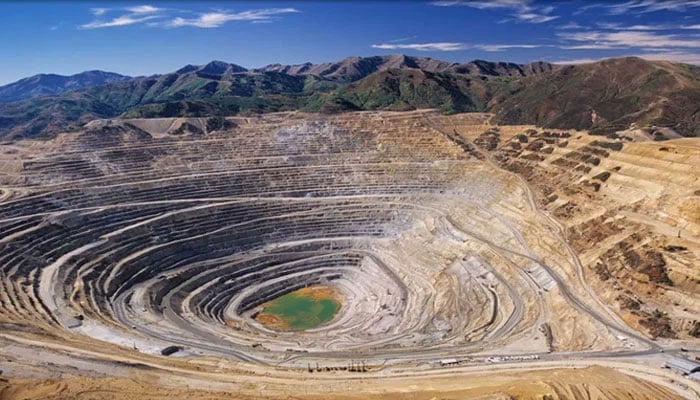Supreme Court wants best incentives for Reko Diq labourers
The Supreme Court stressed ensuring best incentives for the labour force working in the Reko Diq project for exploration of mines and minerals in Balochistan
ISLAMABAD: The Supreme Court on Monday stressed ensuring best incentives for the labour force working in the Reko Diq project for exploration of mines and minerals in Balochistan.
A five-member larger bench of the Apex Court, headed by Chief Justice Umer Ata Bandail and comprising Justice Ijazul Ahsen, Justice Muneeb Akhtar, Justice Yahya Afridi and Justice Jamal Khan Mandokel, heard the presidential reference on a new Reko Diq project.
During the hearing, Chief Justice Umer Ata Bandial asked the counsel for the Barrick Gold Corporation to ensure best incentives to the labour force working in the Reko Diq project. The incentives should be better than being given to the local labour class”, the Chief Justice stressed. In pursuance to the questions raised by the court during the previous hearing about the environmental aspect of the project, Makhdom Ali Khan, counsel for the company submitted before the court that protection of the environment had been specifically taken into account in the project, adding that water to be used in the project by the company was of no use for human consumption, adding that water that would be supplied through the pipeline from Reko Diq would be re-filtered at Gawadr Port.
The counsel submitted that local labour laws would apply to the labour class in the Reko Diq project but added that the values set by the UN as well as International Labour Organization would be adhere to and in letter and spirit.
The Chief Justice asked the counsel as to whether sea water could not be brought to Reko Diq for usage? The counsel replied that as Gawadar was some 680 kilometers away from Reko Diq hence transportation of water on a daily basis was not possible. Justice Jamal Khan Mandokhel observed that the frequent use of water in the project could cause drought in the province. The counsel contended that as per research, the storage of water at Reko Diq was more than the total life span of the project.
“Is it not possible for the foreign company to install a plant for re-cycling the water”, the CJP asked. Justice Yahya Afridi asked the counsel about a comparison between the salary structure of labourers working in the company in Pakistan as well as its on-going projects in other countries.
The Chief Justice asked the counsel about measures for protection and incentives of lobours, settled in the agreement. Justice Ijazul Ahsen observed that there had been violation of rights across the globe of mines labours. He asked the counsel to inform the court about the framework for protection of rights of labours working in the Reko Diq project.
Meanwhile, Jehanzeb Awan, counsel for government organizations investing in the project, submitted that the federal government was investing 50 percent in the project, adding that three government organizations had been investing in the project. These organizations, he said, included Oil and Gas Development Corporation, Pakistan Petroleum Limited and Government Holdings Private Limited. He submitted that the government organisations would make an investment of $3 billion in the project. He submitted that apart from making an investment of 4.5 billion dollars in the project, Pakistan had to pay a fine of 900 million dollars.
He informed the court that the three government financial institutions had so far paid 562 million dollars in lieu of the fine, claimed by international organizations. The counsel further submitted that the project would insure 64 percent benefit to the public sector, adding that audit transactions of the project would be available to the stakeholders as well. Later, the court adjourned the hearing for today (Tuesday).
-
 Kate Middleton Proves She's True 'children's Princess' With THIS Move
Kate Middleton Proves She's True 'children's Princess' With THIS Move -
 Paul Anka Reveals How He Raised Son Ethan Differently From His Daughters
Paul Anka Reveals How He Raised Son Ethan Differently From His Daughters -
 'A Very Special Visitor' Meets Queen Camilla At Clarence House
'A Very Special Visitor' Meets Queen Camilla At Clarence House -
 Jodie Turner Smith Shares One Strict Rule She Follows As A Mom
Jodie Turner Smith Shares One Strict Rule She Follows As A Mom -
 Hailey Bieber Reveals KEY To Balancing Motherhood With Career
Hailey Bieber Reveals KEY To Balancing Motherhood With Career -
 Photo Of Jay-Z, Other Prominent Figures With Jeffrey Epstein Proven To Be Fake
Photo Of Jay-Z, Other Prominent Figures With Jeffrey Epstein Proven To Be Fake -
 Hillary Clinton's Munich Train Video Sparks Conspiracy Theories
Hillary Clinton's Munich Train Video Sparks Conspiracy Theories -
 Fans Slam Talk Show Host For 'cringe' Behavior In Chris Hemsworth Interview
Fans Slam Talk Show Host For 'cringe' Behavior In Chris Hemsworth Interview -
 Woman Jailed Over False 'crime In Space' Claim Against NASA Astronaut
Woman Jailed Over False 'crime In Space' Claim Against NASA Astronaut -
 James Van Der Beek’s Close Pal Reveals Family's Dire Need Of Donations
James Van Der Beek’s Close Pal Reveals Family's Dire Need Of Donations -
 Prince William And Harry's Cousins Attend 'Wuthering Heights' Event
Prince William And Harry's Cousins Attend 'Wuthering Heights' Event -
 Hailey Bieber Turns Heads Just Hours After Major Business Win
Hailey Bieber Turns Heads Just Hours After Major Business Win -
 King Charles' Andrew Decision Labelled 'long Overdue'
King Charles' Andrew Decision Labelled 'long Overdue' -
 Timothee Chalamet 'forever Indebted' To Fan Over Kind Gesture
Timothee Chalamet 'forever Indebted' To Fan Over Kind Gesture -
 Columbia University Sacks Staff Over Epstein Partner's ‘backdoor’ Admission
Columbia University Sacks Staff Over Epstein Partner's ‘backdoor’ Admission -
 Ozzy Osbourne's Family Struggles Behind Closed Doors
Ozzy Osbourne's Family Struggles Behind Closed Doors




